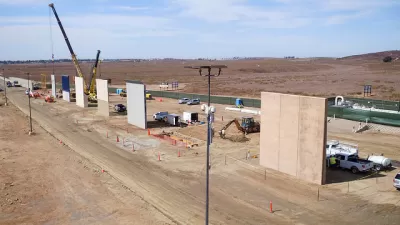Living public figures, whether they be Lockyer, Haggarty, Sarah Palin, or Mummar Gaddafi generate their own fanfare. They do not need a building, an airport, or a trail to speak for them.
California State Treasurer Bill Lockyer would be better off dead.
Hang on. Let me explain.
I wish no harm to the treasurer. I'm willing to assume that he's a decent fellow and a dedicated public servant. Yet, as he walks among the living, even he abides by the whims of human frailty. At least one legislator, and more than a few other civic leaders, in the Bay Area seems to think otherwise.
The other week, San Francisco Chronicle reported that Alameda County Supervisor Scott Haggarty convinced the executive committee of the Association of Bay Area Governments to recommend naming the Bay Trail after Lockyer. The trail sounds fantastic: it's a 300-mile loop up ridges and down canyons that, when completed, will circle the entire San Francisco Bay. ABAG seems to consider the naming a gesture of gratitude, as Lockyer was instrumental in conceiving of the trail while he was a state senator. Assemblywoman Mary Hayashi (D-Castro Valley) has introduced a resolution that would enact ABAG's recommendation.
Even if Haggarty and Hayashi are merely being gracious there's still an argument to be made that the only thanks an elected official needs, deserves, or should seek is that which is deposited into the ballot box. I don't happen to think that public discourse needs to be quite so heartless. But of the million ways to express thanks, something as everlasting as a naming -- of a public facility, no less -- should be reserved only for particular circumstances.
The first criterion must be that the namesake be resting in peace.
Well meaning jurisdictions break this rule all the time, of course. Los Angeles has the (former mayor) Richard J. Riordan Central Library. Sitting L.A. County Supervisor Michael Anotonovich has lent his name both a regional park in Simi Valley and a courthouse in the Antelope Valley. And of course San Jose has the (former U.S. Secretary of Transportation) Norman Y. Mineta San Jose International Airport. "Memorial" appears nowhere in these names because we don't need to "remember" any of these men; they are still very much with us and still very much able to dole out, and accept, political favors.
(Meanwhile, practically all of West Virginia is named for former Senator Robert Byrd. They qualify as monuments now because he's dead -- but he didn't used to be.)
I wish to set aside poststructural arguments that would contend that none of this matters because names -- above all other words -- are merely arbitrary iterations. In common practice, naming connotes reverence. The name should indeed invoke both the virtues and vices associated with its referent. And as long as there are vices yet to be indulged, and as long as history has yet to fully judge the virtues, then the names of the living should belong to only the living.
Living public figures, whether they be Lockyer, Haggarty, Sarah Palin, or Mummar Gaddafi generate their own fanfare. They do not need a building, an airport, or a trail to speak for them. And the truly great can surely stand to include modesty among their virtues. (If wealth is one of those virtues, it's a different story; if you pay for something, you can call it whatever you please.)
By that same token, the living are capable of no small measure of malfeasance, no matter how sterling their reputations may be. Robert Rizzo was once respected; so was Eliot Spitzer. Lockyer could ride out his career with nary a blemish. Or maybe we'll find out that he has squirreled away $26 billion in a Swiss bank account. Wouldn't that be a nice solution to the budget crisis?
A naming, therefore, requires an appraisal of the honoree's entire career. It's not the "Bill Lockyer ca. 2005 - 2009" trail. It's the Bill Lockyer Trail. Impulsive gestures, focused on narrow reasons, undermine the whole exercise of recording and analyzing history. The worst people to pass that judgement are those who have benefited directly from the politician's actions. In other words, namings such as this carry such inherent biases that they necessarily dishonor both the recipients and the bestowers of the honor.
Why is this so important? It's just a trail, right? Sure. But importance and magnitude are not the same thing. The choosing a name wisely is important because of its longevity. Bill Lockyer is no John Muir. But the treasurer's trail is nearly as long as that of the legendary naturalist, and it's probably more heavily traveled. As well, both monuments are intended to last forever, or at least as long as there are mountains and a jurisdiction called California. Forever is a long time to etch on to our sacred landscape the name of someone who has not yet exhausted the days bestowed unto him.
Even when we consider the ennobled dead, no less an exemplar than Abraham Lincoln warned against consecration, lest free people get so caught up in remembering that they neglect the unfinished work that forever lies ahead.
Much of that work falls on the shoulders of public officials, who, one would like to think, accept their positions not for self-aggrandizement but instead out of concern for the public good. A single building need not bend anyone's ego out of whack, but it is not the ego of the official that concerns me. It is, rather, the ego, and the dignity, of the citizen that undergoes a beating when an elected official is so honored.
To give thanks to a legislator gives the legislator more power than he ever deserves. Doing so implies that the legislator serves his constituents out of largesse and not out of duty. This leads to a subtle, but powerful, psychological shift that upsets the power dynamic between servant and served. Look no further than the terrifying embrace of paternalism implied by the nickname of "Uncle Ted" Stevens, the late Alaska senator and no shrinking violet. (He perished in a plane crash in 2010, ten years after the Anchorage airport was named after him.)
But neither constituents nor elected officials should lose sight of who is serving whom. Everyone needs to remember that an elected official who provides for his constituents isn't doing them a favor. He's doing his job.
If we need consider the consequences of aggrandizement, we need only look to that most biased of monument-builders, Ozymandias. In Percy Shelly's narrative, his reign was quickly erased by the sands of time. Let us hope that the good works of Bill Lockyer, Michael Antonovich, and their colleagues last longer than did those of any sneering king.

Planetizen Federal Action Tracker
A weekly monitor of how Trump’s orders and actions are impacting planners and planning in America.

Maui's Vacation Rental Debate Turns Ugly
Verbal attacks, misinformation campaigns and fistfights plague a high-stakes debate to convert thousands of vacation rentals into long-term housing.

San Francisco Suspends Traffic Calming Amidst Record Deaths
Citing “a challenging fiscal landscape,” the city will cease the program on the heels of 42 traffic deaths, including 24 pedestrians.

Amtrak Rolls Out New Orleans to Alabama “Mardi Gras” Train
The new service will operate morning and evening departures between Mobile and New Orleans.

The Subversive Car-Free Guide to Trump's Great American Road Trip
Car-free ways to access Chicagoland’s best tourist attractions.

San Antonio and Austin are Fusing Into one Massive Megaregion
The region spanning the two central Texas cities is growing fast, posing challenges for local infrastructure and water supplies.
Urban Design for Planners 1: Software Tools
This six-course series explores essential urban design concepts using open source software and equips planners with the tools they need to participate fully in the urban design process.
Planning for Universal Design
Learn the tools for implementing Universal Design in planning regulations.
Heyer Gruel & Associates PA
JM Goldson LLC
Custer County Colorado
City of Camden Redevelopment Agency
City of Astoria
Transportation Research & Education Center (TREC) at Portland State University
Jefferson Parish Government
Camden Redevelopment Agency
City of Claremont





























